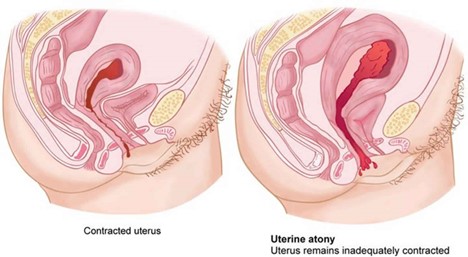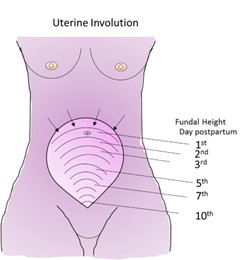A nurse is caring for a client who has just delivered her second twin vaginally and notes that there is excessive bleeding from her vagina and that her uterus feels boggy on palpation.
The nurse should suspect which of the following complications?
Uterine atony
Uterine inversion
Uterine rupture
Uterine infection
The Correct Answer is A
The correct answer is choice A. Uterine atony.
Uterine atony is the failure of the uterus to contract and retract after delivery, which can lead to excessive bleeding and hemorrhage. A boggy uterus on palpation is a sign of uterine atony.
Choice B. Uterine inversion is wrong because it is a rare complication in which the uterus turns inside out and protrudes through the cervix. It usually causes severe pain, shock, and hemorrhage.
Choice C. Uterine rupture is wrong because it is a life-threatening emergency in which the uterus tears open along the scar line of a previous cesarean delivery or other uterine surgery. It usually causes severe abdominal pain, fetal distress, and maternal hypovolemic shock.
Choice D. Uterine infection is wrong because it is an inflammation of the endometrium (the lining of the uterus) caused by bacteria. It usually causes fever, foul-smelling lochia, and lower abdominal tenderness.
Normal ranges for postpartum bleeding are about 500 ml for vaginal delivery and 1000 ml for cesarean delivery. The uterus should feel firm and midline at or below the umbilicus after delivery.

Nursing Test Bank
Naxlex Comprehensive Predictor Exams
Related Questions
Correct Answer is A
Explanation
The correct answer is choice A. Normal involution.
This means that the uterus is returning to its pre-pregnancy size and position after delivery.
The fundus is the upper part of the uterus and it should be firm, midline, and gradually descend into the pelvis.A fundus that is 2 cm below the umbilicus at 4 hours postpartum is within the normal range.
Choice B. Subinvolution is wrong because it refers to a delayed or incomplete involution of the uterus.
This can result in prolonged bleeding, infection, or retained placental fragments.A fundus that is above the umbilicus, boggy, or displaced to one side may indicate subinvolution.
Choice C. Retained placenta is wrong because it means that some or all of the placenta remains in the uterus after delivery.
This can cause heavy bleeding, infection, or uterine atony.A fundus that is high, soft, or tender may indicate retained placenta.
Choice D. Endometritis is wrong because it means that the lining of the uterus is inflamed due to infection.
This can cause fever, foul-smelling lochia, pelvic pain, or uterine tenderness.A fundus that is enlarged, tender, or malodorous may indicate endometritis.
Normal ranges for fundal height after delivery are:
• Immediately after delivery:

Correct Answer is C
Explanation
This is a condition where there is too little amniotic fluid around the fetus.This increases the risk of umbilical cord prolapse because the cord can easily slip past the presenting part of the fetus and into the cervix or vagina.
This can cause fetal hypoxia and distress due to compression or occlusion of the cord.
Choice A. Transverse lie is wrong because this is a condition where the fetus lies horizontally across the uterus.This can increase the risk of cord prolapse if the membranes rupture and the cord descends alongside or before the fetus.
Choice B. Macrosomia is wrong because this is a condition where the fetus is larger than average.This can decrease the risk of cord prolapse because the presenting part of the fetus is more likely to fill the pelvis and prevent the cord from slipping past.
Choice D. Placenta previa is wrong because this is a condition where the placenta covers part or all of the cervix.This can increase the risk of bleeding during labor, but not necessarily cord prolapse.
Whether you are a student looking to ace your exams or a practicing nurse seeking to enhance your expertise , our nursing education contents will empower you with the confidence and competence to make a difference in the lives of patients and become a respected leader in the healthcare field.
Visit Naxlex, invest in your future and unlock endless possibilities with our unparalleled nursing education contents today
Report Wrong Answer on the Current Question
Do you disagree with the answer? If yes, what is your expected answer? Explain.
Kindly be descriptive with the issue you are facing.
